Corresponding author: Yuki Otsuka, otsuka@s.okayama-u.ac.jp
DOI: 10.31662/jmaj.2021-0210
Received: November 16, 2021
Accepted: February 2, 2022
Advance Publication: March 18, 2022
Published: April 15, 2022
Cite this article as:
Takenaka K, Otsuka Y, Nishina T, Kiriyama H. Idiopathic Oblique Muscle Hematoma as a Cause of Lateral Abdominal Pain. JMA J. 2022;5(2):275-276.
Key words: Abdominal wall hematoma, Acute abdomen, Lateral abdominal pain, Oblique muscle hematoma
A 48-year-old Japanese man was admitted to our emergency department with acute-onset sharp left-sided abdominal pain during desk work. Ureterolithiasis was initially suspected; however, it was peculiar in that no costovertebral angle tenderness was detected. Instead, he demonstrated widespread left-sided lateral abdominal tenderness with positive Carnett’s sign. Computed tomography revealed isodensity area along the left internal and external oblique muscles and transversus abdominis muscle, which was consistent with idiopathic oblique muscle hematoma (OMH) (Figure 1).

Abdominal wall hematoma is a rare cause of acute abdomen, most of which are rectus sheath hematomas (RSH) (1). RSH can be misdiagnosed as intraperitoneal diseases, such as diverticulitis, peptic ulcer, or ovarian torsion (2). Similarly, we suggest that OMH, which is an extremely rare cause of abdominal wall hematoma due to the rupture of the deep iliac circumflex artery or intercostal artery, might be misdiagnosed as ureterolithiasis due to its presentation as lateral abdominal pain. About 4% are fatal (1), thus, clinicians must include OMH in their differentials.
None
All authors contributed to patient care. Kenta Takenaka wrote the manuscript and the other authors revised it.
Written informed consent was obtained from the patient to publish.
This study did not require IRB approval.
Shimodaira M, Kitano T, Kibata M, et al. An oblique muscle hematoma as a rare cause of severe abdominal pain: a case report. BMC Res Notes. 2013;6(1):18.
Luhmann A, Williams EV. Rectus sheath hematoma: a series of unfortunate events. World J Surg. 2006;30(11):2050-5.